Related Research Articles

A conscientious objector is an "individual who has claimed the right to refuse to perform military service" on the grounds of freedom of thought, conscience, or religion. The term has also been extended to objecting to working for the military–industrial complex due to a crisis of conscience. In some countries, conscientious objectors are assigned to an alternative civilian service as a substitute for conscription or military service.
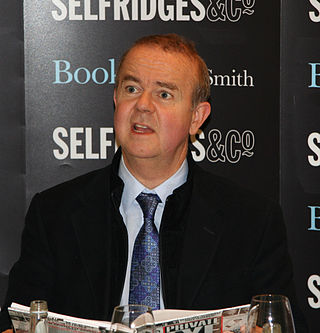
Ian David Hislop is a British journalist, satirist, broadcaster, and editor of the magazine Private Eye. He has appeared on numerous radio and television programmes and has been a team captain on the BBC quiz show Have I Got News for You since the programme's inception in 1990.

The Conscription Crisis of 1917 was a political and military crisis in Canada during World War I. It was mainly caused by disagreement on whether men should be conscripted to fight in the war, but also brought out many issues regarding relations between French Canadians and English Canadians. Almost all French Canadians opposed conscription; they felt that they had no particular loyalty to either Britain or France. Led by Henri Bourassa, they felt their only loyalty was to Canada. English Canadians supported the war effort as they felt stronger ties to the British Empire. On January 1, 1918, the Unionist government began to enforce the Military Service Act. The Act caused 404,385 men to be liable for military service, from which 385,510 sought exemption.

The Friends' Ambulance Unit (FAU) was a volunteer ambulance service, founded by individual members of the British Religious Society of Friends (Quakers), in line with their Peace Testimony. The FAU operated from 1914–1919, 1939–1946 and 1946–1959 in 25 different countries around the world. It was independent of the Quakers' organisation and chiefly staffed by registered conscientious objectors.
Archibald McColl Learmond Baxter was a New Zealand socialist, pacifist and conscientious objector.

Desmond Thomas Doss was a United States Army corporal who served as a combat medic with an infantry company in World War II.
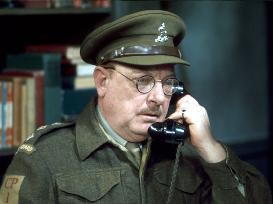
Captain George Mainwaring is a fictional Home Guard captain, first portrayed by Arthur Lowe in the BBC television sitcom Dad's Army. In the 2016 movie he is played by Toby Jones and in the 2019 remake of three missing episodes he is played by Kevin McNally. Mainwaring is the bank manager and Home Guard platoon commander, in the fictional seaside town of Walmington-on-Sea during the Second World War.
"Branded" is the eleventh episode of the third series of the British comedy series Dad's Army. It was originally transmitted on Thursday 20 November 1969.

Private Charles Godfrey MM is a fictional Home Guard platoon member, first portrayed by Arnold Ridley in the BBC television sitcom Dad's Army. and in the 1971 Dad's Army film. He is retired and was previously a tailor for the Civil Service Stores or the Army & Navy Stores. Godfrey was a conscientious objector during the First World War, yet he did work as a stretcher bearer with the Royal Army Medical Corps and earned a Military Medal for taking the wounded off the battle field at the Battle of the Somme. This has earned him great respect among the platoon members and resulted in him being appointed as the First Aid supervisor. Ridley himself fought at the Battle of the Somme during the First World War.
Days of Hope is a BBC television drama serial produced in 1975. The series dealt with the lives of a working-class family from the turmoils of the First World War in 1916 to the General Strike in 1926. It was written by Jim Allen, produced by Tony Garnett and directed by Ken Loach.
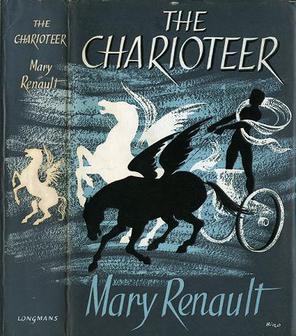
The Charioteer is a war novel by Mary Renault first published in London in 1953. Renault's US publisher (Morrow) refused to publish it until 1959 due to its generally positive portrayal of homosexuality. The Charioteer is significant because it features a prominent – and positive – gay theme at an early date and quickly became a bestseller – particularly within the gay community.
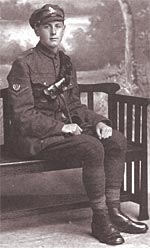
John Ronald Skirth was a British soldier who served in the Royal Garrison Artillery during the First World War.

The Richmond Sixteen were a group of "absolutist" British conscientious objectors during the First World War. Conscripted into the British Army in 1916, they refused to undertake even non-combatant military duties. Brought together at Richmond Castle, Yorkshire, most not knowing each other previously, they were transported to France, where they were court-martialled and formally sentenced to be executed by firing squad, but this sentence was immediately commuted to ten years' penal servitude. They were released in April 1919, several months after the Armistice of 11 November 1918 and a few weeks before the signing of the Treaty of Versailles.
The Non-Combatant Corps (NCC) was a corps of the British Army composed of conscientious objectors as privates, with NCOs and officers seconded from other corps or regiments. Its members fulfilled various non-combatant roles in the army during the First World War, the Second World War and the period of conscription after the Second World War.
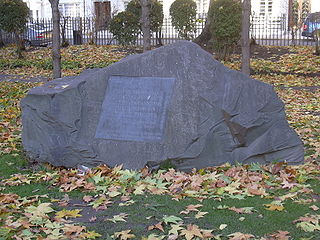
The Conscientious Objectors' Commemorative Stone is on the north side of Tavistock Square, Bloomsbury, in the London Borough of Camden.
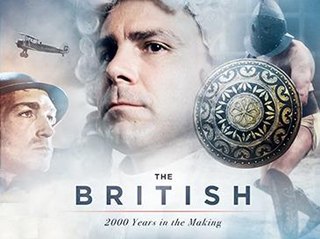
The British is a 2012 British television series produced by Sky Atlantic. It comprises seven fifty-minute episodes. It covers several major events in the history of Britain throughout the years 43 AD to 1953. Including the Norman Conquest, Industrial Revolution and the Queen's Coronation. It stars Russell Brand, Jessie J, and Dame Helen Mirren, and is narrated by Jeremy Irons. It premiered 6 September 2012 on Sky Atlantic.

David Adetayo Olusoga is a British historian, writer, broadcaster, presenter and film-maker. He is Professor of Public History at the University of Manchester. He has presented historical documentaries on the BBC and contributed to The One Show and The Guardian.
Conscientious objection in the United States is based on the Military Selective Service Act, which delegates its implementation to the Selective Service System. Conscientious objection is also recognized by the Department of Defense.
While the Republic of Korea's Constitution states that all citizens, regardless of gender, sex, political or religious affiliation, should be afforded equal treatment under the law, some scholars, such as Intaek Hwang, claim that the culture of militarism is so pervasive that Conscientious Objectors are stripped of the rights discussed in the Constitution when universal male conscription became the law in 1948. A Conscientious Objector is defined as "an individual who has claimed the right to refuse to perform military service on the grounds of freedom of thought, conscience and or religion" by the United Nation's Human Rights Commission. Since the signing of the Conscription Law in 1949, stating that every male 18 years of age must serve in the military, Conscientious Objectors, when found, are arrested and subject to violent punishments.

Eric Barry Wilfred Chappelow was an English poet and conscientious objector during the First World War. His arrest and harsh treatment during four months of imprisonment garnered support from prominent people in Britain, including Chappelow's connections within the literary community. A campaign for his release was supported by Bertrand Russell, W. B. Yeats, and George Bernard Shaw. His arrest and the treatment were highlighted in the House of Commons by the Liberal MP Philip Morrell.
References
- ↑ Not Forgotten: The Men Who Wouldn't Fight, Channel 4, 2008